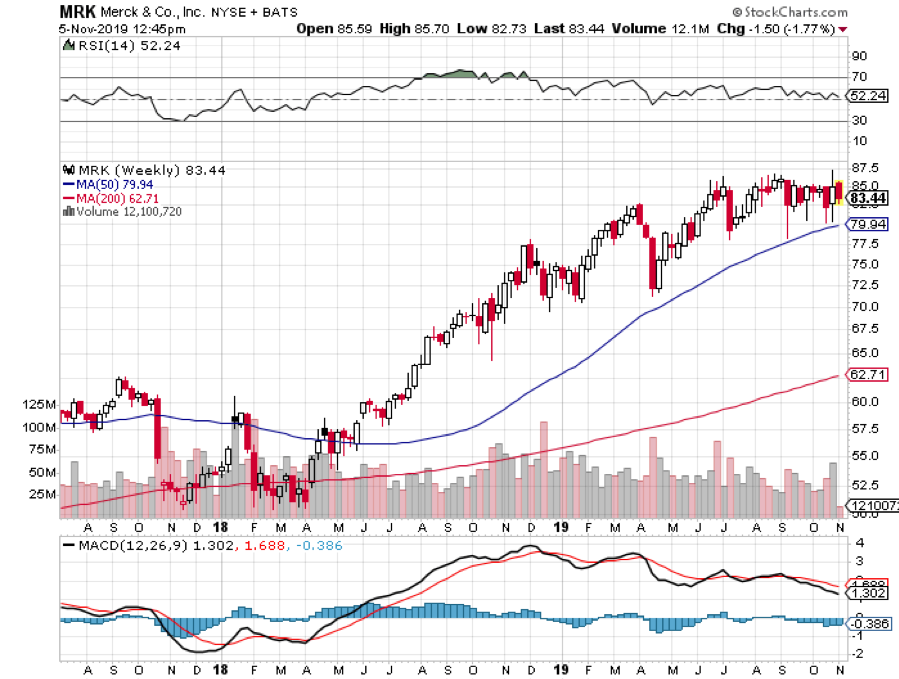Merck Scores Big on Melanoma
I am usually highly averse to buying shares at new all-time highs. The risk/reward is usually terrible.
However, I am going to have to make an exception in the case of Merck (MRK). I wait for a substantial dip to buy into which could last for a lifetime.
Merck shares have just broken out from their 17-year resistance level, which was set in stone in the low to mid-$60s for yonks following recent upbeat earnings estimates. The improvement in its performance has been mostly fueled by the expansion of its blockbuster cancer drug Keytruda.
With the recent success of drug’s campaign to be used in earlier melanoma treatment and even for HIV patients, it looks like Merck investors' fears of reduced exclusivity rights and price controls are all behind them now. Apart from these, Merck has managed to dodge the China trade war since life-saving medications are not likely to be included on Trump’s tariff list.
More power to Keytruda
Merck investors have constantly voiced out concerns over the company’s heavy reliance on Keytruda. However, it appears that there will be no change in the status quo anytime soon.
Earlier this year, Merck received FDA approval to offer Keytruda to metastatic small cell lung cancer patients. This translates to an expanded market for the already successful blockbuster drug and opens up a new avenue for the company to explore.
Prior to this, Merck announced its plan to acquire clinical-stage biotech company Peloton Therapeutics for $1.05 billion. This deal provides Merck with access to Peloton’s work on kidney cancer drugs and its marquee product, renal cell carcinoma treatment PT2977. This strategy, which was disclosed just days before Peloton’s scheduled IPO, exemplifies Merck’s aggressive pursuit of novel and innovative therapeutic candidates.
Apart from this, Merck has also announced its partnership with biotech firm Skyhawk Therapeutics. This deal, in which Skyhawk receives up to $600 million in upfront and potential milestone payments, grants Merck with the exclusive intellectual property rights for all their neurological disease and cancer studies.
Both acquisitions not only bolster Merck’s already promising oncology pipeline thanks to Keytruda’s success but also diversifies the company’s portfolio to cover other diseases.
Keytruda’s massive potential in China
While it has been widely considered that Keytruda lies at the heart of Merck’s success, it appears that the blockbuster drug has yet to reach the peak of its earnings potential. As impressive as it is at the moment, the current popularity of Keytruda could very well double or even triple in the future thanks to Merck’s efforts to tap into China’s cancer market. Needless to say, the success of this endeavor could easily translate into billions of additional sales.
Given the recent approval of Keytruda to tackle an expanded market, its move to cater to the Chinese population denotes significant revenue growth compared to how much they can earn from the US.
Keytruda is anticipated to earn roughly $5 billion in sales from the American market for its lung cancer indication alone. However, China’s much larger population, as well as the greater prevalence of the disease in that region, mean that Merck’s earnings for this drug could be 3.5 times higher than in the US. This estimate doesn’t even include other types of cancer prevalent in the Asian country like liver, breast, and gastric.
What to expect
Given all the moves made by Merck recently and the way its pipeline is shaping up courtesy of its acquisitions, it looks like the company is a prime candidate to rise in the near-term. In fact, Merck is projected to come up with better numbers in the next quarterly earnings report.
Riding the tailwinds of Keytruda’s success, Merck stock is projected to achieve year-over-year growth of 7.55%. Meanwhile, its earnings per share is estimated to hit $1.14. With the company shares rapidly approaching its average 12-month price target of $90.66, Merck is poised to continuously have a bullish outlook this year.
Buy (MRK) on this dip. It’s going to new all-time highs.



